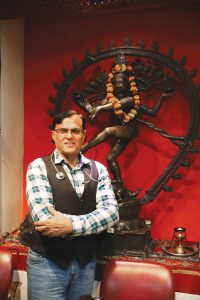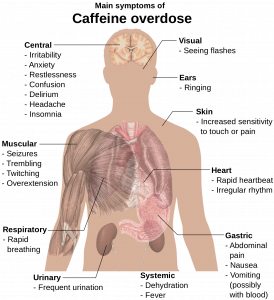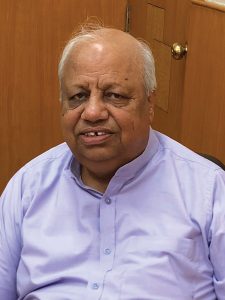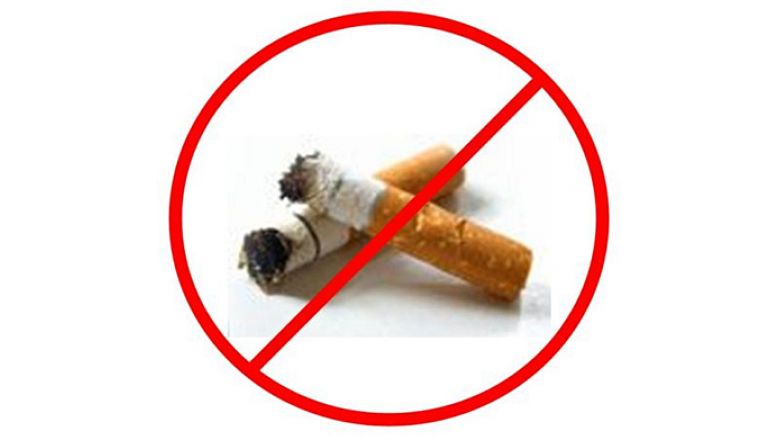SAY NO TO TOBACCO
 Holistic Medicine offers an all-inclusive, natural, and harmless drug-free therapy to get rid of nicotine-dependence.
Holistic Medicine offers an all-inclusive, natural, and harmless drug-free therapy to get rid of nicotine-dependence.
By Dr R K Tuli
Any addiction is never a reflection on the character of the individual. But, it happens as a result of disturbance in the complex balance of neurotransmitters in the brain. The individual seeks solace from the active chemicals in the used substance, which is identified to be nicotine in the case of tobacco.
The root cause of any substance dependence, abuse or addiction comes from repeated positive memory, e.g., that smoking or chewing tobacco brings relief from stressful situations, gives pleasure, enhances ego parity with the peer group, or builds a macho image. This process is further strengthened by sophisticated publicity and promotion launched by tobacco companies.
Unfortunately, no specific medication or particular system of medicine offers reliable and lasting solution to tobacco or any other substance abuse. But, the ‘science’ of practice of medicine combined with its ‘art’ termed Holistic Medicine, enables a very efficient protocol based on optimum synergy of drug-free natural and harmless modalities of various recognised systems of medicine. This approach yields success in over 90% patients with sustainable benefits in willing individuals.
 The need to quit tobacco may be created through awareness of the people about its harmful effects and raising the realisation that by continuing to consume tobacco they are:
The need to quit tobacco may be created through awareness of the people about its harmful effects and raising the realisation that by continuing to consume tobacco they are:
Indulging in ‘self-poisoning’.
Inviting pre-mature aging, and disabilities associated with old age.
Developing early sexual incompetence, infertility, and giving birth to a child with deformities.
Leading to much higher probability to suffer from ill-health, and die from lung diseases, diabetes and its complications, hypertension, heart disease or cardiovascular accidents, all cancers – especially of mouth, throat, larynx and esophagus, etc.;
The individual must appreciate the need to live healthy, increase his chances of living longer, and gain many extra years of happy, healthy existence for himself and his family. By stopping to consume tobacco would save huge expenditure first due to tobacco consumption, and later due to prolonged poor health, increased medical costs due to inevitable sicknesses, prolonged suffering in the long run, and finally early and painful death.
 To get rid of smoking after 10 or 20 years of addiction is a tough challenge. It needs waging a total war on this front! But, the rewards shall be great!! Success in quitting smoking at any stage can reverse its damages over a period of time, and by adopting a healthy life-style the individual can regain positive health and total wellness for decades to come.
To get rid of smoking after 10 or 20 years of addiction is a tough challenge. It needs waging a total war on this front! But, the rewards shall be great!! Success in quitting smoking at any stage can reverse its damages over a period of time, and by adopting a healthy life-style the individual can regain positive health and total wellness for decades to come.
To ensure a win in this war the author has evolved a ‘perfect’ all-inclusive and integrative harmless drug-free therapy comprising laser-acupuncture, reflexotherapy, hypnosis, along with life-style, nutrition and relaxation technique that helps to instantly alleviate stress, anxiety and withdrawal effects of tobacco. It helps to ‘erase’ all past experiences associated with tobacco intake and regulate healthy balance of neurotransmitters in the brain to restore confidence, self-esteem, as well as develop instant aversion to tobacco.
 Fifty years old Arun Tulsian wishes to spread awareness through his own ‘success story’ as he reveals, “I was chewing 40-50 packets of ‘gutka’ daily since the age of 20 and developed pre-cancerous oral fibrosis with the result that I couldn’t open my mouth more than one finger wide. I was suffering from poor health, chronic fatigue, hypertension, diabetes, obesity, severe back pain and inability to walk even a few yards. But, the treatment at Dr. R. K. Tuli’s clinic for Holistic Medicare “SOHAM” for the last four months has given me a new life. I’ve been able to get rid of ‘gutka’ completely, my mouth can now open freely and my taste buds have recovered to enjoy the food again. Besides, I’m full of energy, vitality, pain-free, and follow a healthy life-style including regular Yoga as initiated by Dr. Tuli.”
Fifty years old Arun Tulsian wishes to spread awareness through his own ‘success story’ as he reveals, “I was chewing 40-50 packets of ‘gutka’ daily since the age of 20 and developed pre-cancerous oral fibrosis with the result that I couldn’t open my mouth more than one finger wide. I was suffering from poor health, chronic fatigue, hypertension, diabetes, obesity, severe back pain and inability to walk even a few yards. But, the treatment at Dr. R. K. Tuli’s clinic for Holistic Medicare “SOHAM” for the last four months has given me a new life. I’ve been able to get rid of ‘gutka’ completely, my mouth can now open freely and my taste buds have recovered to enjoy the food again. Besides, I’m full of energy, vitality, pain-free, and follow a healthy life-style including regular Yoga as initiated by Dr. Tuli.”
This all-inclusive and integrated therapy, not only enables to permanently get rid of tobacco and all other addictions, but also activates concurrent elimination of all morbidity due to associated diseases giving an experience of total rejuvenation and positive wellness “body-mind-spirit”. Dr. Tuli wishes all qualified doctors to rise above the limitations of their specialities and enhance their skills to offer Holistic Medicare to their patients and restore the old glory of the medical profession.
(The author is Chief Consultant, Holistic Medicine; formerly with Indraprastha Apollo Hospitals & Indian Air Force, FOUNDER: Society For Holistic Advancement of Medicine (SOHAM), and the Clinic For Holistic MediCARE & CURE, New Delhi)
Takeaways from Recent Workshop on Tobacco Harm Reduction and Cessation
 A round table discussion on Tobacco Harm Reduction and Cessation was successfully carried out at India Habitat Centre, recently.
A round table discussion on Tobacco Harm Reduction and Cessation was successfully carried out at India Habitat Centre, recently.
Many health experts like Dr A K Agarwal (Professor of Excellence, Ex- Dean, Maulana Azad Medical College, New Delhi and Presently Advisor, Apollo Hospitals) and Dr Y K Gupta (Ex Prof and Head of Pharmacology& Dean, AIIMS, New Delhi) welcomed international faculty, Dr Alex (Australia) and Dr Konstatinos (Greece).
A formal introduction of the panelists was followed by an informal lunch to familiarise with each other. Post-lunch, Dr Alex started the discussions with an overview of the huge burden of nicotine dependence both in smoking (100 million) and non-smoking form (200 million) in India. He stressed on certain facts like India is one of the few countries where oral, head & neck cancers far exceed lung cancer. India is unique to the maximum variety of available forms of tobacco and the burden is rapidly growing unlike developed countries, where epidemiologically, a plateau is seen.
He highlighted the various levels of intervention like decreasing demand & supply and increasing awareness. He introduced the concept of harm reduction by an apt definition – reduction in ill-health without necessarily reducing exposure. Thus he clarified that alternate forms of nicotine and e cigarettes are not alternatives, it is not a replacement to quitting but an alternative to not quitting. He introduced the example of Sweden which is the only country to approve SNUS (smokeless tobacco) in Europe.
Dr Konstatinos continued the talk discussing the concept of smokeless tobacco by the multiple RCT and meta-analysis of Swedish versus rest of Europe showing unmatched and unquestionable evidence supporting its benefit.
With only 20 percent success rate of varnecline (the current drug of choice), nicotine cessation programmes have a long way to go to bring out a behavioural change and nicotine harm reduction. Smokeless tobacco may be an effective target in the path to achieve the ultimate goal to cessation.
Dr Y K Gupta presented the current unapproved status of smokeless tobacco in WHO and the current national Indian guidelines. He stressed on the need for awareness to the use of smokeless tobacco products in the specific subset of population who are unable to quit smoking.
These enlightening talks were followed by an open house discussion which included eminent faculty including Dr Ram Chander Jiloha, Service Provider of Psychiatric, Gastroenterologist & Kidney Specialist in New Delhi, Dr Rambha Pathak, Professor and HOD, Public Health, Hamdard Institutes of Medical Science, New Delhi and Dr S P Aggarwal, Dental Surgeon, Green Park Dental, New Delhi, Dr Vikas Malhotra, Department of ENT, Maulana Azad Medical College, New Delhi, Dr Pranav Ish, Assistant Professor, Dept of Pulmonary, Critical care & Sleep Medicine, VMMC & Safdarjung Hospital, New Delhi and others. The open house discussion shed light to issues like the roadblocks, benefits, the limitations and the road ahead for use of smokeless tobacco with special reference to the Indian population.
Dr Agarwal concluded the event by summarizing the crucial points-
There are no current guidelines supporting use of smokeless tobacco in nicotine harm reduction despite evidence from Sweden. This fact stems from the deficient understanding that smokeless tobacco is not as safe as cessation but definitely safer than continued smoking.
Smokeless tobacco for recreational purpose cannot be declared safe and should always be discouraged.
Studies have clearly shown reduction in harm by use of smokeless tobacco in non-quitters with highly significant results. If the use of smokeless tobacco is to be planned, it is to be done with caution keeping strict guidelines and inclusion and exclusion criteria so that only the target population who will have a health benefit are able to use it.

